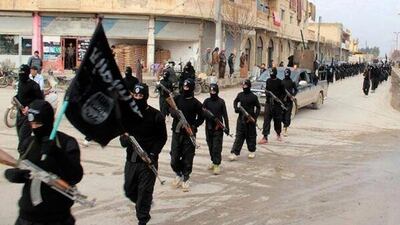When the Arab League met this week to discuss the threat of ISIL, they were meant to address the actions that member states ought to pursue to defeat the militant group. However, many around the region looked on with little hope that the Arab League would deliver any progress.
The Arab League’s previous efforts have given the organisation a reputation for inaction. If the UN is often decried for its lack of effectiveness, it can legitimately claim to have engaged strongly and publicly on some issues. The Arab League would be hard pressed to claim the same.
Even on an issue such as Palestine, where ostensibly there is near unanimous support for the Palestinian struggle, the League has been unable to provide much impact. Similarly, the issue of Syria has proved too difficult for the Arab League to move on.
On the subject of ISIL, the question is more difficult. Within the Arab League, there is clear tension on the question of any kind of Islamism. That will complicate any cooperation between them – even though ISIL is a different type of Islamism altogether.
Perhaps the deepest complication on the question of ISIL emanates from Saudi Arabia. The Saudi government, deeply concerned with blowback on its own soil, has taken a variety of measures to stem the flow of funding from private citizens in the kingdom to terrorist groups elsewhere. There are criticisms that have been made on precisely how much it still needs to do, but the signs are promising in this regard.
The Saudi Grand Mufti has, likewise, condemned ISIL as “enemy number one” of Islam, stating “the ideas of extremism, radicalism and terrorism ... have nothing to do with Islam”.
The condemnations, while no doubt sincere, miss a rather important point that relates to the Arab League's policy towards ISIL. Namely, the stance of its member states when it comes to the ideological roots of that group. That heritage is difficult to understand without relating to the ideas and thought of two thinkers: Sayyid Qutb of the Brotherhood in 1950s and 1960s on the one hand, and Muhammad ibn Abdul Wahab of the purist Salafi movement in the 18th century on the other. Both are key figures within modern Al Qaeda-style radicalism.
When it comes to Qutb, one can at least argue that he was interpreted in a variety of ways, and that the Muslim Brotherhood itself attempted to correct Qutb's ideas and the misinterpretation of them. Some can question whether the effort was sufficient, or if it had the required effect – but at least it took place.
Even the illustrious Ibn Taymiyyah, who is also often cited by radical preachers, has had his intellectual inheritance interrogated.
When it comes to Ibn Abdul Wahab, on the other hand, no such effort has been made by the Saudi Arabian religious establishment. On the contrary, the eponymous founder of purist Salafism continues to be promoted throughout the kingdom, and by graduates of many of its religious institutions, who then travel far and wide across the globe.
Religious ideology is certainly insufficient to explain the terrorist threat on its own – and the numerous studies into Al Qaeda-style terrorism indicate this multifaceted phenomenon. One of those factors remains. Namely, an ideological interpretation of purist Salafism, merged with some other elements – and it requires a response.
It is a task that would normally fall upon religious authorities of Sunni Islam, but the traditional institutions of that line have lost their independence and their credibility in the eyes of far too many.
That becomes ever more highlighted when attempts at deradicalisation take place via religious means. If the scholars engaged in that discussion are not viewed as having a track record of “speaking truth to power”, they will be unable to convince those who are otherwise vulnerable to becoming radicalised.
Yet, these are not the questions that will be raised, discussed and debated at any Arab League meeting any time soon. One expects there to be condemnations, and then more condemnations – but moves that meet the challenge, whether in the world of action or the world of ideas? We may have to wait for that.
Dr HA Hellyer is an associate fellow at the Royal United Services Institute in London and the Brookings Institution in Washington DC
On Twitter: @hahellyer


